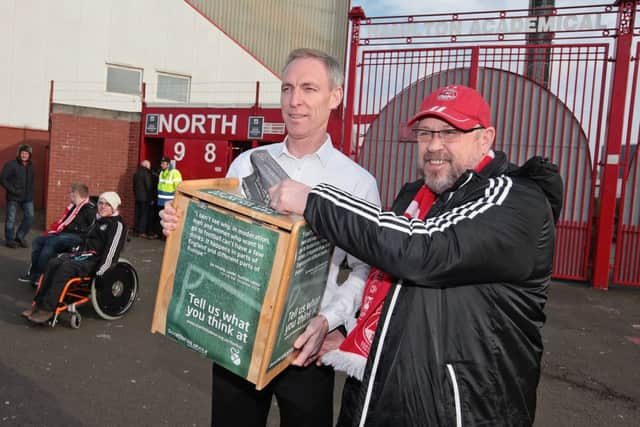Scott Macnab: Jim Murphy has run into trouble


But the Labour leader’s most recent call for a lifting of the ban on alcohol at football grounds appears to be an issue where SNP ministers are drawing their line in the sand.
The suggestion is popular among Scottish clubs who are strapped for cash at time when top-flight sides in England are able to command £10 million a game in TV revenues under the latest deal.
Advertisement
Hide AdAdvertisement
Hide AdAnd while supporters are allowed to have a drink south of the Border, it is easy to see why Murphy’s call will prove popular. He even sees it as a class issue, insisting this is why supposedly posh rugby fans can drink at Murrayfield, while the proletariat must endure a dry 90 minutes at the football.
FOLLOW US
SCOTSMAN TABLET AND MOBILE APPS
But Murphy forgets that rugby decided to “opt-in” to the drink ban when it was introduced in the aftermath of the notorious Scottish Cup final of 1980 between Rangers and Celtic which saw fans rioting on the Hampden pitch and the use of mounted police.
Rugby has no history of fan trouble which was why it was allowed to re-introduce alcohol at grounds in 2007. At the time, justice secretary Kenny MacAskill was believed to be keen on using this as the first step on the path to lifting the ban at football games. But the objections from police and women’s groups at the time were understood to be overwhelming. Mr Murphy claims fans today are being punished for the sins of a previous generation, but it is naive to imagine that trouble has disappeared from the modern game.
Who can forget the shameful scenes in Manchester in 2008 when Rangers fans laid siege on the city at the Uefa Cup final. And the return of the Old Firm clash just a couple of weeks ago was accompanied by unsavoury images of a ten-year-old Rangers fan left with an injured face and three missing teeth after being “bottled” by Celtic fans as he travelled to the game on the bus.
Some might say these are isolated incidents – but incidents of violence and arrests are not uncommon at football matches, unlike rugby. And that’s before the well established rise in domestic violence which happens during Old Firm games is taken into account. No wonder women’s groups are so opposed to the move.
At a time when Scotland is trying to turn around its unhealthy relationship with alcohol, is it really so hard for football fans to go 90 minutes without a drink?